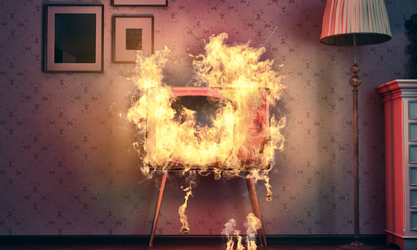
Warner Bros Discovery’s announcement this week of a $9bn (£7bn) writedown in the value of its TV networks is a stark acknowledgment of the damage the streaming wars are inflicting on traditional broadcasting models.
The astonishing figure, which pushed the US entertainment group to a quarterly net loss of $10bn (£7.9bn) and sent shares sliding 12% in early trading on Thursday, lays bare how channels such as CNN, TLC and the Food Network can no longer rely on a captive cable subscriber base.
The rapid consumer shift away from high-priced TV packages, coupled with the inexorable decline in advertising, has forced traditional TV companies to invest billions in low-cost streaming services to catch up with first movers such as Netflix.
The question is now whether companies such as WBD – home to TV and film content including Furiosa: A Mad Max Saga, Godzilla x Kong: The New Empire, The Big Bang Theory, Succession, Friends and all Olympics events – can build the scale and make significant profits from their streaming operations before the death of linear television delivered by cable, satellite or aerial.
“Traditional TV is dying, or at least in zombie mode,” says Alex Degroote, a media analyst. “It is being replaced by a combination of services such as short-form video players like YouTube and TikTok, and the top streamers such as Netflix. WBD’s $9bn impairment is a real hammer blow and will reverberate across all traditional media assets.”
The market value of WBD, home to assets including the Warner Bros film studio, HBO and CNN, has plunged almost 70% in the two years since the group was formed in a $40bn (£31.5bn) merger between WarnerMedia and Discovery intended to help both businesses survive the transition to a streaming future.
“Unfortunately, the stock performance is a clear indication that investors see little optimism that the tides may soon start to turn,” says Robert Fishman, senior analyst at MoffettNathanson.
Earlier this week, Disney disclosed that its streaming operations – which include the global Disney+ service, Hulu and ESPN+ in the US and Hotstar in India – achieved profitability for the first time in the quarter to the end of June.
However, the milestone of $447m (£352m) in operating profit, which was above management projections, has come at a huge cost, with its streaming services running up $11bn (£9.2bn) in losses since Disney+ was launched in 2019.
Disney has more than 200 million global streaming subscribers, and WBD exceeds 100 million globally, with Discovery+ now the fastest-growing service in the UK thanks to winning the rights to show every Olympic discipline. But the battle is not just to continue to drive scale.
Boosting revenue and profits per subscriber has become critical through strategies including rapid rounds of price increases – Disney has just announced a set of price rises for later this year – as well as driving slightly cheaper ad-funded tiers to pull in cost-conscious consumers.
While traditional TV companies struggle with managing the decline in their legacy businesses, with drastic rounds of cost-cutting after a decade of profligate spending on content in the first decade of the streaming wars, Netflix points to a viable future.
The streaming giant, which once struggled with mounting losses running into tens of billions of dollars, has seen its market value surge by more than 50% over the past year after turning the profitability corner while continuing to see significant growth in subscribers.
WBD’s chief executive, David Zaslav, who has considered breaking up the company but concluded that is not currently the best option, said the market was being hit by a “generational disruption” that requires traditional TV companies to take “bold, necessary steps”.
Richard Broughton, director at Ampere Analysis, said: “Legacy TV businesses are in decline but the shift is not so rapid that it can’t be managed. There are still a lot of broadcast TV viewers, they have the time to pivot to profitability in the streaming world.”
The Guardian
Archive [August 9 2024]